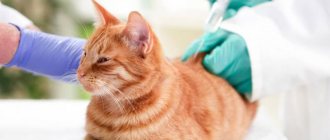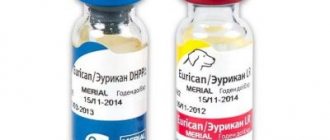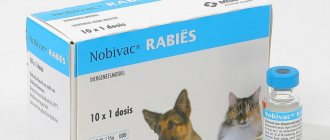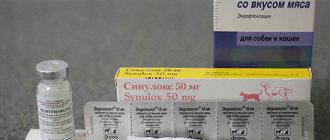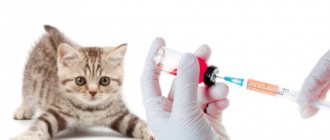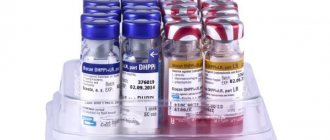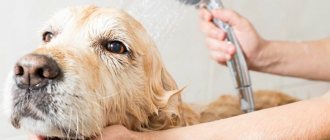Every person who brings a puppy into their home should know the answer to the question: “Vaccination against rabies for a dog: how often should it be done, and how long does it last?” The fight against this viral disease is a top priority for the animal owner. After all, it can provoke the death of a pet.
A pet can catch the disease from any wild animal: squirrels, foxes, bats. Animals living near forests and city parks have a high risk of infection. Only vaccination carried out at municipal veterinary stations and in private clinics can protect them from the virus.
What is rabies in dogs
Rabies (hydrophobia, hydrophobia) is a deadly, acute infection of warm-blooded animals caused by a neurotropic virus from the rhabdovirus family (Neuroryctes rabid). It primarily affects the central nervous system organs, causing irreversible changes.
The source of infection for dogs is sick, infected animals (predators, rodents, birds, cats, dogs), which spread the virus into the environment and pose a threat to healthy pets.
Important! The duration of the incubation period ranges from several days, weeks to two to four months. Rhabdovirus is detected in the saliva of a sick dog approximately five to six days before the characteristic symptoms of this infection appear.
Virus replication occurs primarily in the salivary glands of a sick animal, so infection occurs during a bite. The infection penetrates through mucous membranes and damaged skin (through wounds).
Having penetrated the animal’s body, the rhabdovirus moves not only with the bloodstream, but also along the nerve fibers, affecting the spinal cord and brain, where its further active reproduction occurs.
Forms, stages of rabies
Rabies occurs in an acute, hyperacute form. The infection has several stages of development:
- Prodromal. Lasts 48-72 hours. The dog's behavior changes. The animal shows anxiety, reacts inadequately to stimuli, hides in dark places, is reluctant to make contact, or, on the contrary, requires excessive attention from the owners. The dog may show unreasonable aggression or appear depressed.
- Manic. The state of excitement gives way to apathy. The dog reacts strangely to stimuli, does not follow commands, shows disobedience, can eat inedible objects, and show aggression towards the owner and members of his family. Foamy drooling, grasping movements with the mouth, aggression towards dogs, animals, strangers, fear of bright light, the sound of water. In this state, the dog can run away from home and travel long distances.
- Paralytic (silent). The state of violence is replaced by strong oppression and apathy. Paralysis of the muscles of the pharynx and hind limbs develops, and the tongue falls out. There is no appetite due to spasms of the laryngeal muscles. Heart rhythm and breathing are impaired. A few days later the dog falls into a coma and dies from severe exhaustion, intoxication, and irreversible changes in the body.
Rabies also occurs in an atypical, abortive form (in bitches), recurrent, in which the symptoms subside and increase with renewed vigor after a few days or weeks. The atypical form in dogs manifests itself with signs of acute gastroenteritis (bloody foamy vomiting, diarrhea, refusal to eat).
Rules for rabies vaccination of dogs
Timely preventive vaccination and subsequent revaccinations will help protect your pet from rabies, other viral-bacterial, parasitic infections and diseases.
Before vaccination, owners must prepare their pet and know the rules for vaccinating dogs against rabies.
Note! Only clinically healthy animals without obvious manifestations, symptoms of diseases and pathologies are allowed for immunization.
Keep in mind that each manufacturer of rabies vaccine indicates contraindications, certain requirements, rules, and recommendations for immunization, which are indicated in the annotation for the veterinary drug.
The schedule of vaccinations and revaccinations is prescribed by the veterinarian after conducting comprehensive examinations of the dog and passing tests. When drawing up an immunization schedule, the timing of the administration of anti-plague vaccines is taken into account.
A qualified veterinarian must vaccinate your dog against rabies. The cost of vaccination depends on the type of vaccine and vaccination services. After vaccination, the veterinary passport is stamped, signed by the doctor, the date of immunization is indicated, as well as what vaccine was used for immunization.
What is vaccination and why is it needed?
This is the process of infecting the body of a healthy dog with a strain of the virus in order to acquire stable immunity to the disease. A vaccinated animal is immune to most dangerous diseases and, even if infected, does not suffer from complications. Also, vaccinating dogs allows you to maintain the health of the dog's offspring, its owners and others.
In addition to the obvious health benefits, having all the necessary vaccinations is required for transporting animals by public transport, participating in exhibitions, and serving in veterinary clinics.
Pros and cons of vaccination
Vaccination is the only effective way to protect your pet from many infections. But even this argument is not always compelling for many dog owners. Some breeders believe that vaccination is harmful to the dog’s health, and vaccination is an unnecessary service and unnecessary costs. In general, this is a misconception.
Do not forget that many infections and diseases, even with timely treatment, cause irreversible changes in the animal’s body and can cause death.
Should you vaccinate your dog against rabies? The answer is definitely yes. Rabies is an infection for which there is currently no cure.
Even if you have a decorative miniature breed dog, and he has virtually no contact with stray animals, this does not mean that the dog should not be vaccinated against rabies. Sick dogs must be euthanized.
Arguments in favor of vaccination
- After vaccination, dogs develop specific immunity to diseases.
- Modern vaccines do not harm pets.
- Vaccination protects against many viral and bacterial diseases, including rabies.
- Without vaccinations, a dog is not allowed for exhibitions or breeding. If an animal is not vaccinated against rabies, travel to many countries around the world is prohibited.
Against vaccination
According to recent studies, it has been found that annual revaccinations weaken the animal’s immunity and turn acute diseases into chronic ones. Thus, many dogs that were annually vaccinated against rabies after clinical examinations were diagnosed with disorders of the spinal cord, degenerative myelopathy with the gradual development of paralysis of the hind limbs.
But still, we do not recommend refusing vaccinations or neglecting the vaccination schedule established by the veterinarian, since this is the only way that reduces the risk of infection.
Interesting! There are vaccines that require revaccination not once a year, but every 24-48 months.
When to vaccinate a puppy
Vaccination of puppies begins when they reach three months of age. If there are no strong viral pathogens in the environment and the situation is favorable, then the dog can be vaccinated at the age of 6 months to 1 year.
This is only possible if the puppy's mother is vaccinated, otherwise there is a risk that she will accidentally catch the virus and pass it on to her baby. If dog diseases often occur in the environment, then it is better to vaccinate the puppy at 3 months; before that, you should spend less time walking, if possible, work with the animal at home, give it physical activity, and play.
Preparing for vaccination
There are no particular difficulties in preparing for vaccination. However, it is important to always remember the mandatory pre-treatment against worms. It is necessary to ensure that excessive amounts of toxins do not interfere with the formation of immunity to pathogens. If there are worms, the vaccination will be useless, ineffective, and there will be no immunity to rabies.
You should also treat against insects and other parasites. It is important to carefully monitor your pet’s health, since any deterioration in health, weakness, or refusal to eat can affect the result of vaccination.
It is not easy to vaccinate, but also to be sure that the animal is completely safe, that it is not at risk of rabies if it interacts with a contaminated environment, and that the health of your loved ones will not be at risk.
Vaccines against rabies in dogs
More than 100 years have passed since L. Pasteur created the first rabies vaccine. Today, the modern market offers a wide variety of safe, effective veterinary medications, produced domestically or abroad. They differ in the principle of action and the period of protection of the body from infections.
To vaccinate dogs against rabies, veterinary medicine uses inactivated and live rabies vaccines created on the basis of virus strains grown in the cellular structures of laboratory animals.
Rabies vaccines for dogs:
- Nobivac Rabies (Holland) – monovaccine against rabies.
- Bioveta Biocan DHPPi + LR – polyvaccine (distemper, parvovirus, parainfluenza, leptospirosis, rabies).
- Defensor-3 is a monovaccine.
- Dipentovak (Russia) – a polyvaccine against several infections.
- Merial Rabisin (France) – monovaccine against rabies.
- Eurikan DHPPi + 2LR – polyvaccine.
- Virbac Rabigen Mono – against rabies.
- Intervet Nobi-Vac RL - against rabies, leptospirosis.
- Merial Eurican DHPPI2+LR - prevention of plague, adenovirus, rabies, parainfluenza.
- Merial Hexadog is a polyvaccine against rabies and other infections.
Rabies vaccines are intended for dogs of various age groups and breeds. The optimal vaccine for your pet will be selected by a veterinarian who will carry out preventive immunization or revaccination.
If necessary, you can vaccinate your dog with a polyvaccine that prevents your pet from becoming infected with rabies and other dangerous viral infections (distemper, leptospirosis, hepatitis) or a monovaccine that is effective against a specific pathogen.
What are dogs usually vaccinated against?
Diseases requiring mandatory vaccination
- Rabies
. A fatal disease that is dangerous not only for dogs, but also for people. Rabies vaccination is a mandatory procedure for every pet over 3 months old. - Plague of carnivores ("distemper")
. A very common disease that affects the nervous system of animals, mainly puppies. The plague is difficult to tolerate and becomes chronic with complications such as convulsions and paralysis. Often leads to the painful and rapid death of the dog. - Parvovirus enteritis, parvovirosis (“Olympics”)
. A contagious viral disease with complications on the heart muscle. Expressed as an acute gastrointestinal disorder. It mainly affects small puppies, although adults with reduced immunity can also become ill. Requires mandatory vaccination as it is extremely contagious. - Coronavirus enteritis
. A disease that causes severe damage to the intestines with complications on the liver and pancreas, often leading to the painful death of the pet from vomiting, diarrhea and dehydration - Infectious adenovirus
. This infectious disease is also called “kennel cough” because it is typical for animals living in a flock. A complication of andenovirosis is acute pneumonia, often fatal. - Viral, infectious hepatitis
. This is a disease characterized by high mortality. Young dogs often experience it in an acute form, while animals over 3 years of age acquire a chronic form. - Leptospirosis
. A bacterial infection transmitted from wild animals and rodents. Contagious to humans. It is difficult to treat and occurs in a severe form with damage to the gastrointestinal tract, kidneys, and liver. - Dermatomycosis (ringworm)
. An unpleasant disease caused by fungi. It is very disturbing to animals and often leads to baldness of large areas of the skin. - Parainfluenza
. A viral disease with dangerous complications in the form of acute pneumonia. Animals living in a flock are usually vaccinated against parainfluenza.
Age for first vaccination
Puppies can receive their first rabies vaccination starting at three months of age. As a rule, the age for the first vaccination is 2-2.5 months. Therefore, preventive vaccination against rabies with a mono- or polyvaccine is best combined with a second vaccination, which is given approximately two to three weeks after the first in the absence of contraindications.
Important! The age of first vaccination largely depends on the epizootological situation in a particular region, as well as on the living conditions of the animals. For example, if a puppy has been bitten by a potentially dangerous animal and is kept in a shelter or kennel (group housing), it is vaccinated at 2 months of age.
The manufacturer of rabies vaccines indicates for what age the veterinary drug is intended.
- If the puppy is vaccinated before three months, repeated administration is required after 16-21 days.
- For babies over three months of age, a single dose of the vaccine is sufficient to form specific immunity.
- If the puppy has not been vaccinated before the change of milk teeth, vaccination against rabies is carried out at the age of seven to nine months. In this case, all vaccinations for the pet must be completed before the age of one year.
When should my pet have its first vaccination?
Opinions differ regarding the timing of comprehensive immunization of dogs:
- A number of experts believe that every animal over 40 days old should be given medication for the rabies virus, unless there are contraindications. This approach allows you to protect him from infection through contact with other animals.
- Domestic veterinarians advise vaccinating a puppy for the first time at the age of three months. By this time, the pet should get stronger, gain the required weight and often walk outside. The risk of complications after administration of the drug in this case is reduced.
The final decision on immunizing an animal must be made for each pet individually, taking into account the duration of the vaccine, the general condition of the four-legged friend, and the presence of contraindications to the procedure.
Validity period and frequency of revaccination
Puppies are vaccinated against rabies again only 12-13 months after the first injection. If you vaccinate a puppy before this time, the body may respond with a non-standard reaction.
Important! Depending on the type of drug, revaccination is carried out annually or every 24-36 months. The veterinarian establishes the preventive immunization schedule.
The duration of validity and frequency of revaccination depends on the type of vaccine, manufacturer, age of the animal, and the situation in the region.
- After the administration of “Rabican”, the animal’s body is protected for 12 months with a single injection, and with a double dose – for 24-26 months.
- "Rabizin" forms specific immunity for a period of 33-38 months, so revaccination is carried out every three years.
- Hunting breeds, free-ranging animals, as well as dogs living in regions unfavorable for rabies are vaccinated against this infection annually. As a rule, vaccination is carried out in the spring or autumn.
Remember! A gentle revaccination scheme is intended for animals of older age groups and weakened dogs.
Preparing for vaccination
Puppy and adult dogs must be prepared for preventive immunization.
Preparation for vaccination involves:
- Deworming with complex anthelmintics. Anthelmintics are given to the dog two to three weeks before the rabies vaccine is administered. If you are in doubt about the choice of anthelmintic drug, consult your veterinarian.
- Treatment against ectoparasites with insecto-acaricidal agents.
- Monitoring the pet's health.
A few days before vaccination, do not expose your pet to stress or excessive loads that weaken the body. Do not allow contact with stray animals or dogs, as it is very important that the dog does not catch the infection. Adult dogs can be latent carriers of infections, so choose secluded, quiet places for walks.
Important! If the vaccination is scheduled for the afternoon, the dog is given light food in small quantities. The dog can drink water in unlimited quantities. If the injection is planned for the first half of the day, the rabies vaccine is administered on an empty stomach.
Two days before vaccination, measure your temperature twice a day, morning and evening. Write down the indicators in a notebook and provide them to the veterinarian.
Before the injection, a complete examination of the animal is carried out. Puppies and adults must be in normal condition, active, energetic, and healthy.
Preparing your pet for the procedure
In order for your dog to be vaccinated without complications, you must first perform a number of procedures. Among them:
- Deworming. As part of this, your pet needs to be given special tablets or suspensions that will remove worms from the animal’s body. It is mandatory to carry out before each vaccination, regardless of whether you are injecting your puppy for the first time or repeatedly.
- Reducing walking time. The dog breeder is recommended to take the pet out into the fresh air for a short time, visit well-known places near the house, and make sure that the four-legged friend does not become hypothermic. Before vaccination against rabies, you need to protect your puppy from contact with other animals, especially wild ones.
- Maintaining your usual diet. During preparation for vaccination, you can give your pet its usual food. There is no need to offer new products. On the day the medication is administered, it is better not to feed the animal - this will allow the drug to act faster and give a better effect.
- Temperature measurement before the procedure itself. It should not be high or low. If this indicator does not correspond to the norm, it is better to postpone visiting the doctor. You should also examine the dog to make sure that it is healthy and does not need emergency veterinary care. Your pet's body temperature should be monitored on the eve of vaccination.
It is also important to avoid all kinds of stress for your four-legged friend. They can negatively affect his health.
What to do after vaccination
After preventive vaccination, revaccination against rabies and other infections, the veterinarian will provide the owner with the necessary recommendations on the maintenance and care of the vaccinated animal. In order for your pet to tolerate vaccination normally, strictly follow the specialist’s instructions and carefully monitor your dog’s condition.
Advice! After immunization, we do not recommend leaving the veterinary hospital for 20-30 minutes, as there is a risk of developing an acute allergy to the components of the veterinary drug. If necessary, a clinic specialist will provide timely emergency assistance to your pet.
After the administration of rabies vaccines, animals are kept in quarantine for approximately 15-22 days. Do not allow the dog to come into contact with other dogs, especially street or stray animals. The formation of specific immunity occurs only on the 20-22nd day. Until the end of this period, the risk of infection remains.
For the first two to three days, the owner must closely monitor the health and behavior of the pet. Noticing any deviations. Signs of illness, immediately contact the veterinarian who administered the vaccination.
Provide your pet with proper care, follow the regime, daily routine, and think about the diet . Protect your dog from stressful situations, drafts, hypothermia, and overheating. Until the end of quarantine, you should not expose your dog to excessive physical and mental stress. You can bathe your pet no earlier than two to three weeks after vaccination.
Does a vaccinated dog need special care?
After the first immunization, the animal owner must monitor the condition of his pet for 21 days. If the drug was reintroduced, quarantine after vaccination is reduced to 14 days. At this time, the owner of the animal must follow these rules:
- Protect your four-legged friend from contact with other animals.
- Make sure that the pet does not become hypothermic, avoid bathing and long walks for a while, and do not get the injection site wet.
- Limit physical activity; during this period, you cannot conduct long training sessions or learn new commands.
- Monitor the puppy’s nutrition, give him proven balanced food, and do not introduce new foods into the diet.
- Make sure that your pet does not lie in a draft.
Also, after the first or second vaccination, the animal cannot be transported from place to place. You need to wait a month for the animal to fully recover. Only after this will you be able to move to a new place of residence or go to another country.
Contraindications
As already noted, only clinically healthy animals are allowed to be vaccinated. Therefore, before vaccinating your dog or puppy against rabies, take your pet to a veterinary clinic for an examination.
Contraindications to vaccination:
- severe weakening, exhaustion of the body;
- postoperative period;
- change of teeth;
- several weeks after ear cropping;
- helminthic infestations, parasitic diseases;
- high, unstable temperature, fever;
- individual intolerance by the body to vaccine components;
- bacterial, viral diseases.
Puppies over 2 months old, pregnant and lactating females, and dogs that have had viral, fungal, parasitic infections or diseases are not allowed to be vaccinated.
Reaction to rabies vaccination in dogs
Despite the fact that modern rabies vaccines, according to manufacturers, rarely cause side effects or complications, the pet’s body may react differently to their administration and components.
A small, firm, round swelling most often forms at the injection site. The skin is tight and hot to the touch. If the lump does not increase and the dog does not experience pain upon palpation, there is no need to panic. The lump will disappear without intervention in about 15-22 days.
In the first 10-12 hours after the injection, there may be a slight increase in temperature by 0.5-1 degrees, decreased activity, drowsiness, and indigestion (diarrhea, vomiting). The dog may refuse food or offered treats, be reluctant to make contact, and react weakly to stimuli. This is a normal reaction to the vaccine.
Possible complications and side effects
As a rule, a reaction to a vaccination in a dog occurs due to the incompetence of the doctor, if the vaccination was carried out on a weakened animal, sick with hidden diseases, when using low-quality, expired vaccines, as well as in the case of individual intolerance by the dog’s body to the components of the vaccine.
Possible complications and side effects after vaccination may develop immediately after vaccination or during the first day after the injection.
Side symptoms:
- debilitating vomiting, profuse diarrhea;
- allergic rash, itching;
- temperature rise 1-2 degrees above normal;
- convulsions, muscle spasms, trembling;
- refusal to feed, increased thirst;
- severe depression, lethargy, apathy;
- cyanosis, pallor of mucous membranes;
- salivation, discharge from the nose, eyes;
- impairment of respiratory and cardiac function.
If the above symptoms do not go away within 6-12 hours after vaccination, the dog’s condition worsens sharply, call a veterinarian at home or take the dog to the clinic for emergency care.
Is it possible to vaccinate yourself?
People who do not have special education and experience working with animals are not recommended to immunize their dog on their own. There are a number of reasons for this:
- A non-specialist may not be able to determine the presence of contraindications and may give an injection during estrus, stress, or at elevated temperatures. This will have a negative impact on the animal's health.
- There are certain requirements for the storage and use of medications that are difficult to comply with at home. Their violation leads to the appearance of side effects after vaccination of animals.
- The owner will not be able to provide proper assistance to the animal if he is allergic to the drug. This threatens the death of your four-legged friend.
In exceptional cases: if there is a high risk of infection, if there are no veterinary clinics in the area where you live, you can carry out the procedure yourself. To do this, you should study the instructions for the use of anti-rabies drugs and strictly follow their requirements.


